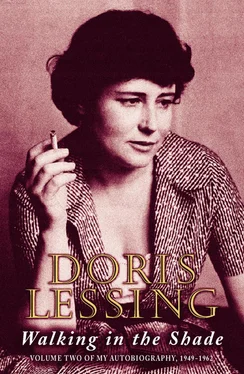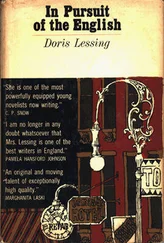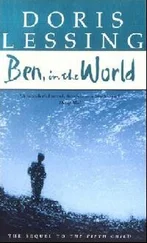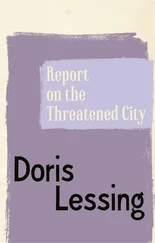There was another thing: I had seen too many of the kind who run around saying, ‘I am a communist,’ but wouldn’t dream of joining the Party. I despised them. Quite soon, in London, there would be a new generation of young people saying, ‘I am a communist,’ to shock the bourgeoisie, to annoy mummy and daddy, to give themselves and others an enjoyable frisson.
I was interviewed by Sam Aaronivitch, cultural commissar. He was a very young man, lean, stern, military in style, with the grim, sardonic humour of the times. He had been a very poor boy, from the East End. The Young Communist League had been his education but not his nursery, because he was a Jew and one of a people of a Book. I have several times been told by children of the Jewish East End how they listened to fathers, uncles, elder brothers, even mothers, argue politics, philosophy, religion, around meal tables on which there might be hardly enough to eat. Why had ‘the Party’ chosen a young man who had read nothing of modern literature, and was not interested in the arts, to represent culture? The interview was in the Communist Party headquarters in King Street, Covent Garden. (‘King Street says…’ ‘Those idiots in King Street…’ ‘I was summoned to King Street, but I told them that…’) He heard me out, like an officer interviewing a rookie, and said he was intrigued to meet an intellectual who wanted to join the Party, when most of them were leaving it, and he looked forward to reading my denunciations of the Party when I left. Then he took me on a tour of the East End, where he had grown up. Sam does not remember doing this, but it is one of the vividest of my memories of those early days in London. He was showing me a culture already dead, which he regretted, because of its guts and its cohesiveness. Sam has had a various life, or perhaps one should say lives: one of them as ‘the Balliol Marxist’. Sometimes we meet, when he is sprinting and I am ambling across Hampstead Heath. We reminisce: I remember this, he remembers that – for instance, that Peter used to spend weekends and play with his daughter Sabrina. He is now helping the Bangladeshi community who live in the streets where he grew up. The Bangladeshis in East London are people of a Book, but for some reason theirs does not do for them what the Jews’ Book did for them, producing the passionately polemical, intellectual, clever people who were able to rise above their poverty to invigorate the worlds of learning, business, and the arts. The children do not grow up hearing fathers, mothers, uncles, elder brothers, argue about religion, politics, literature; they do not hear poetry and bits from great novels quoted in support of arguments. When they go to school they do not do brilliantly, as did the poor Jews who lived before them in those streets.
One of the reasons some found it hard to leave the Party was precisely because there were so many colourful, extraordinary people in it. Good people, generous, kind, clever.
I shall mention two out of many. Once, when I was so short of money I didn’t know what to do, thought I would have to give up trying to live on my earnings and get a job, I got a letter quite out of the blue from people I did not know, communists, who wrote to say they had heard I was hard up, they liked my books, and enclosed one hundred pounds. That was a lot of money then. They did not want me to return it, but when I had enough, they would like me to send it on to someone who needed it, with the same request: to hand it on to someone in need. I shall be forever grateful to these people, whom I never met.
A bit later, when feeling imprisoned by the stratifications of the class system, I asked the Communist Party to arrange a visit for me to a mining community. I found this village, Armsthorpe, near Doncaster, grim, depressing; and yet it had been recently built and the people in it felt themselves lucky compared with families living in some of the old villages. A miner, his wife, three adolescent children. He had been a communist for years, and so had she. The house was full of books: I saw no other books in the houses of the village. They listened to music on the radio, and plays. They talked about how Sybil Thorndike had brought a company to play Shakespeare to the miners in the middle of the war. Everyone in the community remembered this. These two had travelled to the Soviet Union and to other communist countries. That was before mass tourism; they were the only travelled people in the village. He was a father figure, or unofficial representative; people dropped in all the time to ask his advice. Everything he said about the mining community, about Britain, about his life – the usual story of bitter poverty in the twenties and thirties – was full of information and good sense. Everything he said about the Soviet Union and the communist world was nonsense. To have said to this man, What you admire so much is an illusion, and Stalin is a monster – that would have killed something in him: hope, a belief in humankind. This kind of dichotomy, on one side everything that was sound and sensible and honest, and on the other a mirage of lies, was common.
I used to lie awake, for the two weeks of my visit, in the living room on a sofa immediately under their bedroom and hear him coughing just above my head. He had lung disease from the pit, and he knew he would die soon. He wouldn’t allow his children to go near the mines; it was a life for a dog.
Walking with him through the street, I saw a group of young miners, just up from the pit, wearing cheap best suits and red scarves, having showered in the pithead baths. They were off to Doncaster for the evening. They greeted my host, nodded to me. The old miner was full of an angry tenderness for them: what were they eating, they didn’t look well, those scarves weren’t enough to keep them warm. You could see their affection for him.
I used this experience in a short story, ‘England Versus England.’
My Party card was in fact delayed. I had been invited to go to the Soviet Union for the Authors World Peace Appeal: that kind of inspirational organization flourished then. It had been started by Naomi Mitchison and Alex Comfort. Few people could be found who would go. The atmosphere was such that I got letters and telephone calls saying that I would disappear into a concentration camp. When I said that it was hardly likely that the Union of Soviet Writers would allow eminent guests to disappear – surely bad publicity for them? – I was told (like Moidi Jokl with Gottfried), ‘You don’t understand anything about communism. It would serve you right if you were bumped off.’
There were six of us: Naomi Mitchison herself. Her cousin Douglas Young, because he understood Russian. Arnold Kettle, a well-known Marxist literary critic from Leeds University. A. E. Coppard, the short-story writer. Richard Mason, the author of The Wind Cannot Read, a best-selling novel from the war, about a young English soldier in love with a half-caste nurse. And myself, a very new writer. This, we knew, was hardly the level of literary repute the Russians must have been hoping to attract for the first visit of writers from the West since the war – this was 1952.
There was a preliminary meeting, passionate and polemical, violent. Alex Comfort hated that there would be a communist on the delegation, Arnold Kettle, who would try to pull the wool over our eyes and feed us lies. Naomi refuted this. She knew Arnold, who was a sweet young man. A. E. Coppard, as innocent as a babe about politics, had gone to the Wrotslav Peace Conference and fallen in love with communism, as if he had been given a potion. The meeting developed into a plan with detailed instructions, from Alex Comfort, on how to outwit Arnold. I think Richard Mason was present.
Meanwhile the Party had decided it was not a good thing to have two communists on the trip; one was enough. They told me not to join, formally, until after I returned. This made me uncomfortable, put me at once in a false position. Deception w-as not, really, in my nature. An immediate, direct openness, often criticised as tactlessness, was more my line.
Читать дальше












